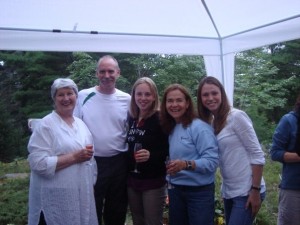From Across Generations: Care Stories from Student Part Four
As part of the Caring Across Generations campaign, the Student Labor Action Project is proud to present a series of care stories from students. These stories not only show the true human impact of homecare in the country, but also that it is an issue that is not relegated to the elderly or adults.
Submit your own care story here.
The third story in the series comes from University of Massachusetts-Amherst student Sarah Kelley. Sarah Kelley is a 5th year student at UMass Amherst studying Anthropology, Spanish, and Civic Engagement. A UMass SLAP member and previous Mass Jobs with Justice intern, Sarah has been involved in student organizing and activism on campus and in the Boston area.
Here is her story.
 The care crisis pervades virtually all areas of my life.
The care crisis pervades virtually all areas of my life.
As a fitness manager at a continued care facility, my mother witnesses daily how essential quality care is for our elderly population. As cuts are made to federal and state funded health programs, healthcare workers like my father, a 58 year-old nurse, suffer the dire consequences as they are expected to do more and more back-breaking work with less and less resources. Both my parents love the work they do and often joke that they’re invincible strength will keep them “workin’ till the day they die”. We laugh, but underneath their pride is uneasiness very real to the thousands of Americans from the baby-boomer generation. This uneasiness stems from the reality that (eventually) they will need to retire, and will likely be dependent on health services provided by a system that has consistently prioritized profit over people.
My sister, a 26-year old college graduate with a physical disability, also plans on entering the medical field. Unfortunately, physical and financial limitations, including pricy medical bills and the skyrocketing cost of graduate school, have delayed her from achieving this dream. I myself have been a student with severe chronic pain for two years. Like so many Americans in need of care, my sister and I have become vulnerable to a medical model that understands people with non- temporary disabilities as “defective” or inadequate, and thus indebted with economic and social penalties.
This is why I fight for an end to the care crisis. Because I am the granddaughter of a cancer survivor in need of quality care, a daughter of aging-yet-determined baby-boomers, a sister to a young adult with physical limitations, a friend to single mothers on Medicaid and unemployed college graduates. Because I have heard the distressing stories of homecare workers without the right to organize, and because I am a female student with a disability at a public university where I watch my university health services slashed again and again.
But most importantly, I fight because I am a human, united with all other humans by the basic need for care and support. It is campaigns like Caring Across Generations that remind me of this interdependence: that no matter who you are or what sector of society you are a part of, the care crisis affects us all. Moving forward, we must continue to spread this message and keep fighting so that we may be treated with the respect and care we all deserve.
